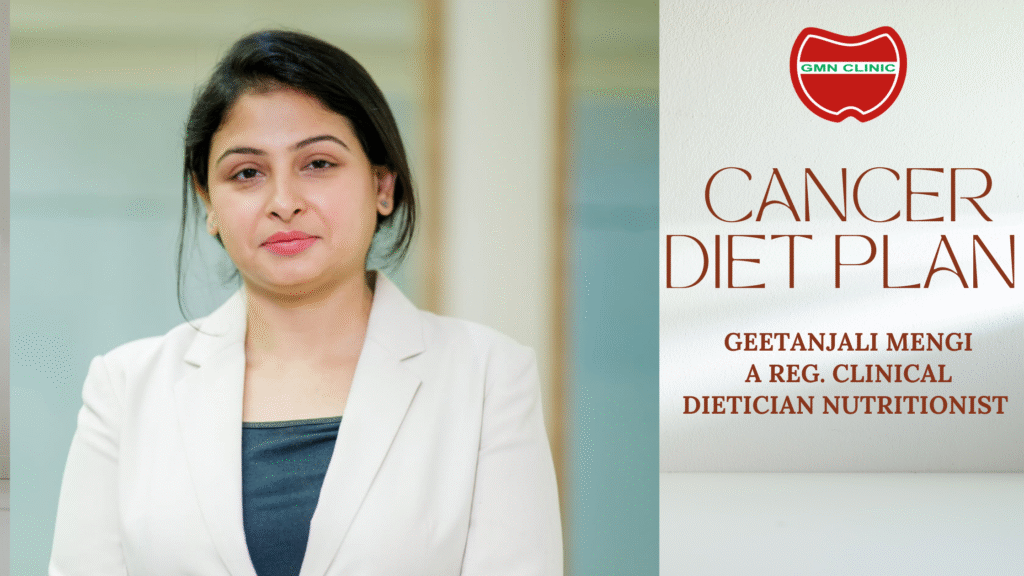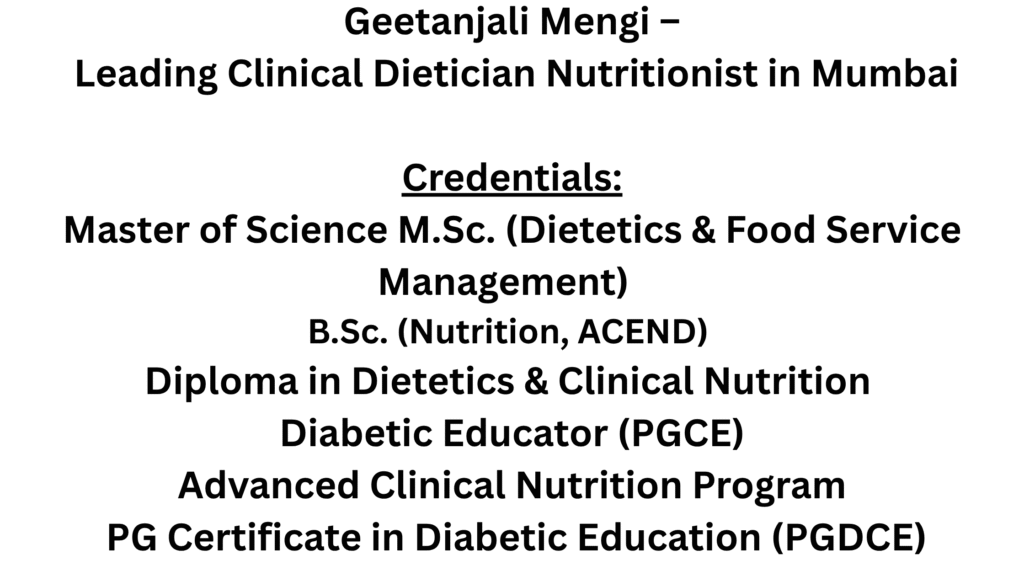CANCER REG.CLINICAL DIETICIAN NUTRITIONIST IN MUMBAI

Dr. Geetanjali Ahuja Mengi is a highly respected, registered dietitian-nutritionist based in Mumbai, with over 20 years of experience in clinical and therapeutic nutrition. She holds a Master of Science in Dietetics & Food Service Management (MSc DFSM), a Post Graduate Diploma in Dietetics & Clinical Nutrition,
and specialized credentials including certification as a Diabetes Educator and advanced clinical nutrition training.
Over her career, she has served tens of thousands of clients (across 44+ countries) and operated multiple clinic locations in Mumbai (Bandra, Santacruz, Dadar, Charni Road, Kemp’s Corner) for both in‐person and online consultations.
Geetanjali’s philosophy is grounded in evidence-based, personalized nutrition—no crash diets, no “one size fits all.” Each patient receives detailed attention, follow-ups, and nutrition plans tailored to their health history, lifestyle, and goals.
As a cancer dietitian, my role involves providing specialized nutritional guidance and support to individuals who are undergoing cancer treatment or are cancer survivors. My main objectives are to manage symptoms, maintain strength and energy levels, support the immune system, and optimize overall health and well-being throughout the cancer journey.
I Geetanjali Mengi Conducts comprehensive assessments of patients’ nutritional status, dietary intake, weight changes, and specific nutritional needs based on their type and stage of cancer, treatment plan, and individual health goals.
Why a Cancer Diet Specialist Matters?
Cancer, its treatments (chemotherapy, radiation, surgery), and the recovery process impose extraordinary stress on the body. Side effects such as nausea,
appetite loss, taste changes, weight loss or gain, and metabolic disruptions must be managed carefully.
A dietician experienced in oncology nutrition plays a critical role in:
* Supporting immunity & recovery
* Maintaining muscle mass, strength, and functional status
* Mitigating side effects like gastrointestinal upset
* Optimizing energy intake and nutrient absorption
* Improving quality of life and treatment adherence
* Reducing risk of malnutrition
* Guiding transitions during remission / survivorship
By combining clinical evidence with compassion, a cancer dietician can become a lifeline for patients and caregivers during vulnerable phases.
We develop personalized nutrition plans tailored to each patient’s unique needs, preferences, and medical conditions. This may involve addressing issues such as appetite loss, nausea, taste changes, difficulty swallowing, and food intolerances.
We at Geetanjali Nutrition center help patients about common cancer treatment side effects and how nutrition can help manage them. This includes providing strategies to alleviate nausea, vomiting, diarrhea, constipation, fatigue, mouth sores, and changes in taste or smell.
We plan a balanced and nutrient-rich diet that includes a variety of fruits, vegetables, whole grains, lean proteins, and healthy fats. Providing guidance on portion control, hydration, and mindful eating practices.
We help patients to achieve and maintain a healthy weight before, during, and after cancer treatment. This may involve strategies for preventing unintended weight loss, supporting weight stabilization, or addressing weight gain and obesity-related concerns.

key Benefits for Patients and Families
– Boosts strength and treatment tolerance
– Minimizes side effects of chemotherapy, radiation, or surgery
– Prevents nutrient deficiency and malnutrition
– Enhances quality of life and recovery during and after treatment
– Includes food safety, flexible meal planning, and practical eating-out guidance
– Weekly check-ins and frequent plan updates ensure continuous improvement and motivation
Booking and Availability
– Clinics: Bandra, Santacruz, Dadar, Charni Road, Kemps Corner, and more across Mumbai.
– Online programs: Serve patients across India and in 44+ countries, offering digital meal plans and remote support.
– Easy booking: Website forms, phone, and WhatsApp are available for instant appointments.
Frequently Asked Questions (FAQs)- Cancer
cancer diet refers to a personalized nutritional plan designed to support someone undergoing cancer treatment. It helps maintain strength, manage side effects (nausea, loss of appetite, weight loss, digestion issues), and promote recovery by ensuring adequate nutrients.
While diet alone can’t cure cancer, proper nutrition can support the body’s resilience, improve tolerance to treatments (chemotherapy, radiation), reduce complications, and improve quality of life during treatment.
It’s best to begin as early as possible: ideally upon diagnosis, or at the start of treatment. Early nutritional support helps mitigate weight loss, muscle wasting, and treatment side effects.
The plan may emphasize:
* High-protein foods (lean meats, eggs, legumes, dairy or plant-based proteins)
* Healthy fats (nuts, seeds, avocados, olive oil)
* Plenty of colorful vegetables and fruits (as tolerated)
* Whole grains and complex carbohydrates
* Adequate hydration and fluids
* Foods rich in micronutrients (vitamins, minerals, antioxidants)
Your dietician may also tailor or exclude certain items depending on your treatment, side effects, and individual tolerances.
Depending on your condition, you may need to avoid or limit:
* Raw or undercooked meats, eggs, seafood (due to risk of infection)
* Unpasteurized dairy products
* Sugary, highly processed or junk foods in excess
* Alcohol (unless cleared by your oncologist)
* Spicy, acidic or very rough-fiber foods if you have mouth sores, diarrhea or GI discomfort
We offer both in-person (for Mumbai area) and online consultations. Frequency depends on your treatment phase: weekly, biweekly or monthly. Between sessions, you can share diet logs or symptoms, and we adjust the plan accordingly.
Your dietician will suggest modifications like:
* Gentle, bland, soft-textured foods
* Small frequent meals instead of large meals
* Nutrient-dense smoothies or liquid supplements
* Food rotation to combat taste changes
* Foods with aroma or texture modifications
All tailored to your comfort while still meeting nutritional goals.
We typically begin with an assessment including: medical history, cancer type and stage, ongoing treatments, lab reports, weight, body composition, food intake, digestive symptoms, and preferences. Based on that, we build a plan specific to you.
While results vary, with good adherence you may see:
* Better energy and strength
* Stabilized or improved body weight
* Fewer or less severe treatment side effects
* Improved healing and recovery
* Enhanced quality of life
Ms. Geetanjali Mengi will consult you and all the follow-ups are taken by her.
Free Consultation – Start Your Wellness Journey Today
Book a complimentary, no-obligation phone consultation and discover how we can help you achieve your health goals. During this call, we will:
* Give you a clear overview of how our nutrition program works
* Understand your personal health goals and expectations
* Explain our pricing, packages, and payment options
* Clarify how insurance coverage may apply
* Help you choose the right practitioner for your needs
* Answer all your doubts and questions
* And guide you with anything else you may need
Take the first step toward a healthier, happier you—your free consultation awaits!